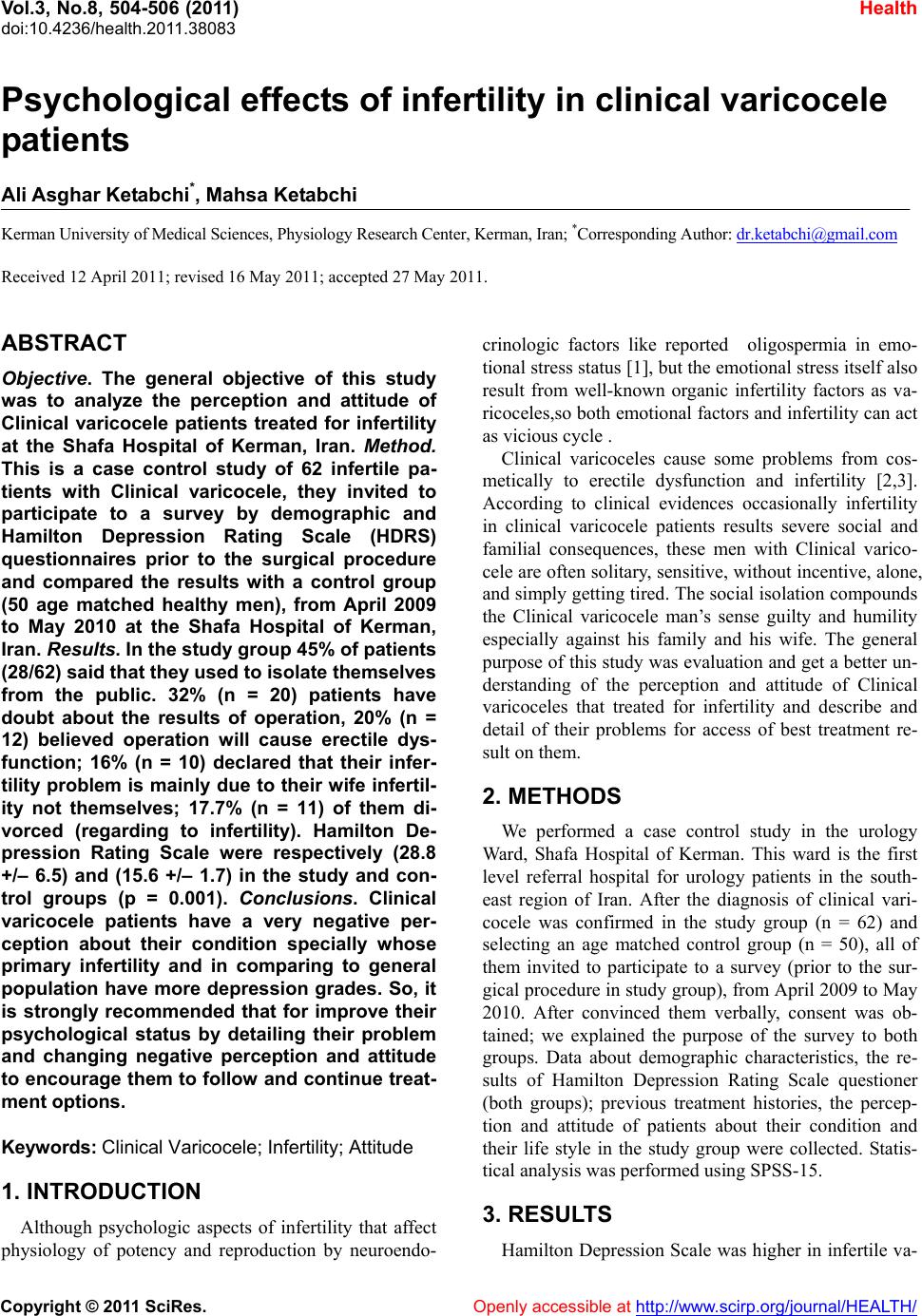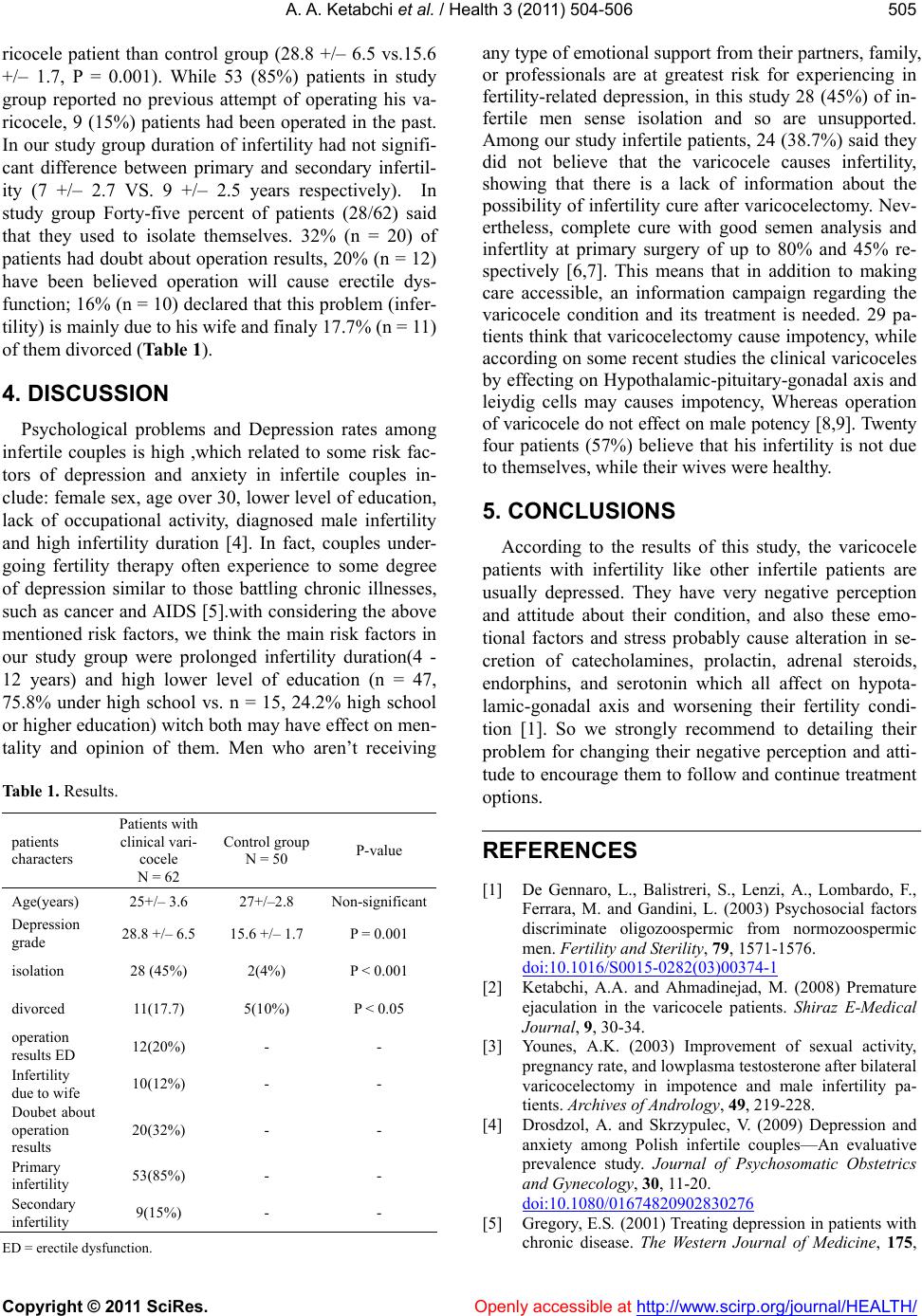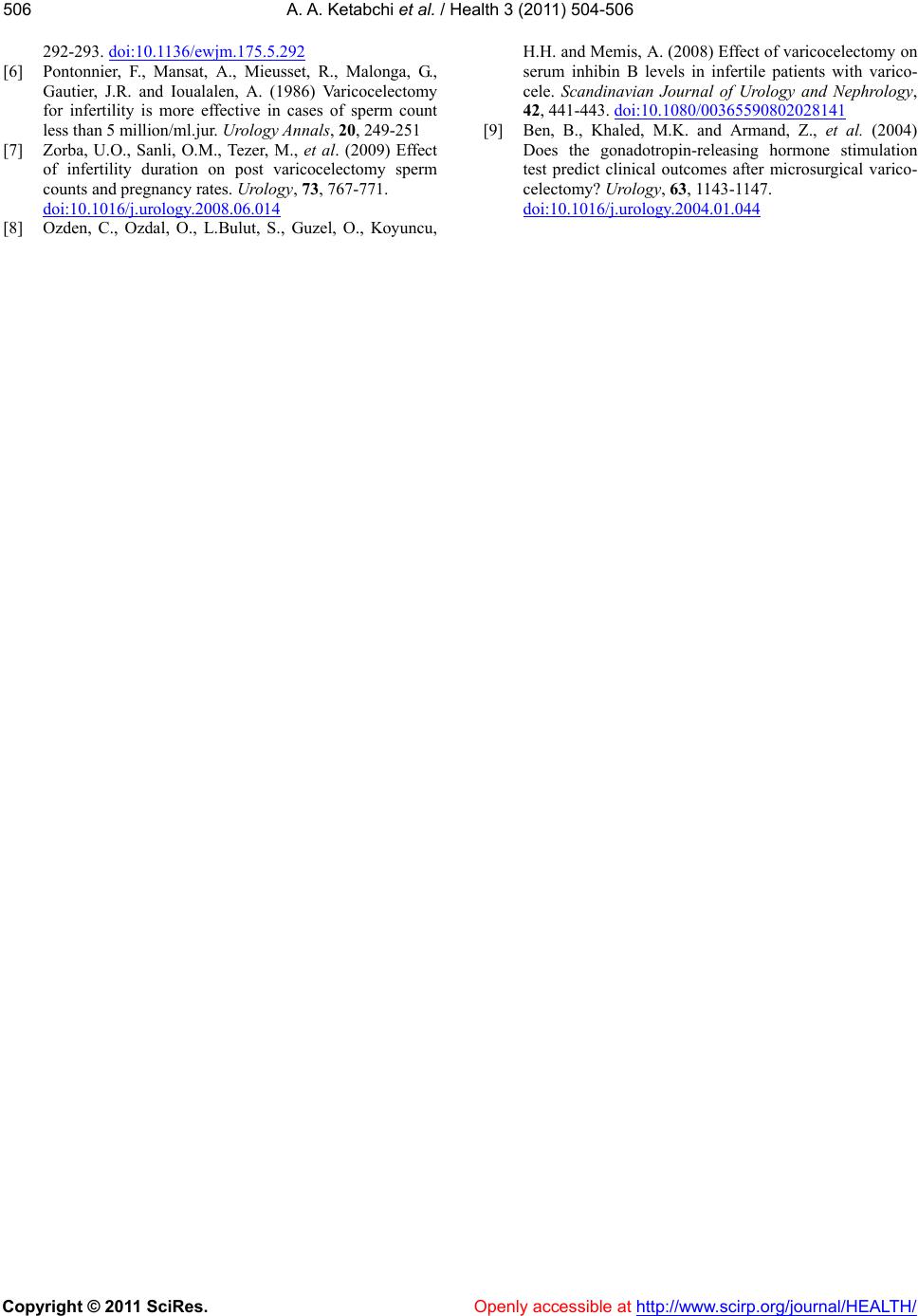Paper Menu >>
Journal Menu >>
 Vol.3, No.8, 504-506 (2011) Health doi:10.4236/health.2011.38083 Copyright © 2011 SciRes. Openly accessible at http://www.scirp.org/journal/HEALTH/ Psychological effects of infertility in clinical varicocele patients Ali Asghar Ket abchi*, Mahsa Ketabchi Kerman Univ ersit y of Med ical S ciences , P hysiology R es earch C ent er, K erm an, Ir an; *Corresponding Author: dr.ketabchi@gmail.com Received 12 April 2011; revised 16 May 2011; accepted 27 May 2011. ABSTRACT Objective. The general objective of this study was to analyze the perception and attitude of Clinical varicocele patients treated for infertility at the Shafa Hospital of Kerman, Iran. Method. This is a case control study of 62 infertile pa- tients with Clinical varicocele, they invited to participate to a survey by demographic and Hamilton Depression Rating Scale (HDRS) questionnaires prior to the surgical procedure and compared the results with a control group (50 age matched healthy men), from April 2009 to May 2010 at the Shafa Hospital of Kerman, Iran. Results. In the study group 45% of patients (28/62) said that they used to isolate themselves from the public. 32% (n = 20) patients have doubt about the results of operation, 20% (n = 12) believed operation will cause erectile dys- function; 16% (n = 10) declared that their infer- tility problem is mainly due to their wife infertil- ity not themselves; 17.7% (n = 11) of them di- vorced (regarding to infertility). Hamilton De- pression Rating Scale were respectively (28.8 +/– 6.5) and (15.6 +/– 1.7) in the study and con- trol groups (p = 0.001). Conclusions. Clinical varicocele patients have a very negative per- ception about their condition specially whose primary infertility and in comparing to general population have more depression grades. So, it is strongly recommended that for improve their psychological status by detailing their problem and changing negative perception and attitude to encourage them to follow and continue treat- ment options. Keywords: Clinical Varicocele; Infertility; Attitude 1. INTRODUCTION Although psychologic aspects of infertility that affect physiology of potency and reproduction by neuroendo- crinologic factors like reported oligospermia in emo- tional stress status [1], but the emotional stress itself also result from well-known organic infertility factors as va- ricoceles,so both emotional factors and infertility can act as vicious cycle . Clinical varicoceles cause some problems from cos- metically to erectile dysfunction and infertility [2,3]. According to clinical evidences occasionally infertility in clinical varicocele patients results severe social and familial consequences, these men with Clinical varico- cele are often solitary, sen sitive, without incentiv e, alone, and simply getting tired. Th e social isolation compounds the Clinical varicocele man’s sense guilty and humility especially against his family and his wife. The general purpose of th is study was evaluation and get a better un- derstanding of the perception and attitude of Clinical varicoceles that treated for infertility and describe and detail of their problems for access of best treatment re- sult on them. 2. METHODS We performed a case control study in the urology Ward, Shafa Hospital of Kerman. This ward is the first level referral hospital for urology patients in the south- east region of Iran. After the diagnosis of clinical vari- cocele was confirmed in the study group (n = 62) and selecting an age matched control group (n = 50), all of them invited to participate to a survey (prior to the sur- gical procedure in study group ), from April 2009 to May 2010. After convinced them verbally, consent was ob- tained; we explained the purpose of the survey to both groups. Data about demographic characteristics, the re- sults of Hamilton Depression Rating Scale questioner (both groups); previous treatment histories, the percep- tion and attitude of patients about their condition and their life style in the study group were collected. Statis- tical analysis was performed using SPSS-15. 3. RESULTS Hamilton Depression Scale was higher in infertile va-  A. A. Ketabchi et al. / Health 3 (2011) 504-506 Copyright © 2011 SciRes. Openly accessible at http://www.scirp.org/journal/HEALTH/ 505 ricocele patient than control group (28.8 +/– 6.5 vs.15.6 +/– 1.7, P = 0.001). While 53 (85%) patients in study group reported no previous attempt of operating his va- ricocele, 9 (15%) patients had been operated in the past. In our study group duration of infertility had not signifi- cant difference between primary and secondary infertil- ity (7 +/– 2.7 VS. 9 +/– 2.5 years respectively). In study group Forty-five percent of patients (28/62) said that they used to isolate themselves. 32% (n = 20) of patients had doubt about operation results, 20% (n = 12) have been believed operation will cause erectile dys- function; 16% (n = 10) declared tha t thi s prob lem ( inf er- tility) is mainly due to his wife and finaly 17.7% (n = 11) of them divorced (Table 1). 4. DISCUSSION Psychological problems and Depression rates among infertile couples is high ,which related to some risk fac- tors of depression and anxiety in infertile couples in- clude: female sex, age over 30, lower lev el of education, lack of occupational activity, diagnosed male infertility and high infertility duration [4]. In fact, couples under- going fertility therapy often experience to some degree of depression similar to those battling chronic illnesses, such as can cer and AIDS [5].with con sidering the above mentioned risk factors, we think the main risk factors in our study group were prolonged infertility duration(4 - 12 years) and high lower level of education (n = 47, 75.8% under high school vs. n = 15, 24.2% high school or higher education) witch both may have effect on men- tality and opinion of them. Men who aren’t receiving Table 1. Results. patients characters Patients with clinical vari- cocele N = 62 Control group N = 50 P-value Age(years) 25+/– 3.6 27+/–2.8 Non-significant Depression grade 28.8 +/– 6.5 15.6 +/– 1.7 P = 0.001 isolation 28 (45%) 2(4%) P < 0.001 divorced 11(17.7) 5(10%) P < 0.05 operation results ED 12(20%) - - Infertility due to wife 10(12%) - - Doubet about operation results 20(32%) - - Primary infertility 53(85%) - - Secondary infertility 9(15%) - - ED = erectile dysfunction. any type of emotional support from their partners, family, or professionals are at greatest risk for experiencing in fertility-related depression, in this study 28 (45%) of in- fertile men sense isolation and so are unsupported. Among our study infertile patients, 24 (38.7%) said they did not believe that the varicocele causes infertility, showing that there is a lack of information about the possibility of infertility cure after v aricocelectomy. Nev- ertheless, complete cure with good semen analysis and infertlity at primary surgery of up to 80% and 45% re- spectively [6,7]. This means that in addition to making care accessible, an information campaign regarding the varicocele condition and its treatment is needed. 29 pa- tients think that varicocelectomy cause impotency, while according on some recent studies the clinical varicoceles by effecting on Hypothalamic-pituitary-gonadal ax is and leiydig cells may causes impotency, Whereas operation of varicocele do not effect on male potency [8,9]. Twenty four patients (57%) believe that his infertility is not due to themselves, while their wives were healthy. 5. CONCLUSIONS According to the results of this study, the varicocele patients with infertility like other infertile patients are usually depressed. They have very negative perception and attitude about their condition, and also these emo- tional factors and stress probably cause alteration in se- cretion of catecholamines, prolactin, adrenal steroids, endorphins, and serotonin which all affect on hypota- lamic-gonadal axis and worsening their fertility condi- tion [1]. So we strongly recommend to detailing their problem for changing their negative perception and atti- tude to encourage them to follow and continue treatment options. REFERENCES [1] De Gennaro, L., Balistreri, S., Lenzi, A., Lombardo, F., Ferrara, M. and Gandini, L. (2003) Psychosocial factors discriminate oligozoospermic from normozoospermic men. Fertility and Sterility, 79, 1571-1576. doi:10.1016/S0015-0282(03)00374-1 [2] Ketabchi, A.A. and Ahmadinejad, M. (2008) Premature ejaculation in the varicocele patients. Shiraz E-Medical Journal, 9, 30-34. [3] Younes, A.K. (2003) Improvement of sexual activity, pregnancy rate, and lowplasma testosterone a f t er bilateral varicocelectomy in impotence and male infertility pa- tients. Archives of Andrology, 49, 219-228. [4] Drosdzol, A. and Skrzypulec, V. (2009) Depression and anxiety among Polish infertile couples—An evaluative prevalence study. Journal of Psychosomatic Obstetrics and Gynecology, 30, 11-20. doi:10.1080/01674820902830276 [5] Gregory, E.S. (2001) Treating depression in patients with chronic disease. The Western Journal of Medicine, 175,  A. A. Ketabchi et al. / Health 3 (2011) 504-506 Copyright © 2011 SciRes. Openly accessible at http://www.scirp.org/journal/HEALTH/ 506 292-293. doi:10.1136/ewjm.175.5.292 [6] Pontonnier, F., Mansat, A., Mieusset, R., Malonga, G., Gautier, J.R. and Ioualalen, A. (1986) Varicocelectomy for infertility is more effective in cases of sperm count less than 5 million/ ml.jur. Urology Annals, 20, 249-251 [7] Zorba, U.O., Sanli, O.M., Tezer, M., et al. (2009) Effect of infertility duration on post varicocelectomy sperm counts and pregnancy rates. Urology, 73, 767-771. doi:10.1016/j.urology.2008.06.014 [8] Ozden, C., Ozdal, O., L.Bulut, S., Guzel, O., Koyuncu, H.H. and Memis, A. (2008) Effect of varicocelectomy on serum inhibin B levels in infertile patients with varico- cele. Scandinavian Journal of Urology and Nephrology, 42, 441-443. doi:10.1080/00365590802028141 [9] Ben, B., Khaled, M.K. and Armand, Z., et al. (2004) Does the gonadotropin-releasing hormone stimulation test predict clinical outcomes after microsurgical varico- celectomy? Urology, 63, 1143-1147. doi:10.1016/j.urology.2004.01.044 |

